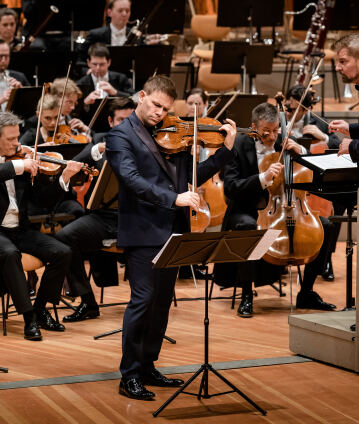Matthias Pintscher conducts Ligeti, Zimmermann and Martinů

György Ligeti was inspired by the Catholic requiem mass to write one of the great choral works of the 20th century. His Requiem features an enthralling tonal language – performed here with Matthias Pintscher. And both Bernd Alois Zimmermann’s Musique pour les soupers du Roi Ubu and Bohuslav Martinů’s Viola Concerto (soloist: Amihai Grosz) make hidden references to requiem settings by other composers.
Music that slowly changes shape like a cloud: György Ligeti’s Requiem contains the fascinating webs of sound for which the composer was celebrated from the early 1960s onwards. Right at the beginning of the opulently scored work, darkly shaded with contrabass clarinet, contrabassoon, contrabass trombone and contrabass tuba, the music is “brought to an apparent standstill” as individual, moving “choral voices intertwine” and “suspend their movements” (Ligeti).
Ligeti’s haunting Requiem setting, which according to the composer was not written for liturgical reasons but was inspired by images of the Last Judgement, is juxtaposed with a work that is entirely secular: Bernd Alois Zimmermann’s Musique pour les soupers du Roi Ubu. It is a “farce based on Alfred Jarry’s theatrical grotesque about the murderous usurper of the same name, which comes across as staid and seemingly cheerful, fat and gluttonous like Ubu himself” (Zimmermann).
The evening closes with Bohuslav Martinů’s moving Rhapsody-Concerto for viola and orchestra, which quotes the main Kyrie theme from Antonín Dvořák’s Requiem in the opening movement. This introspective, neo-Romantic piece from 1952 became one of the most frequently performed viola concertos of the 20th century. The soloist is Amihai Grosz, first principal violist of the Berliner Philharmoniker. Matthias Pintscher, director of the Ensemble Intercontemporain, a specialist in new and contemporary music, took over the conducting duties for Simon Rattle, who had to withdraw at short notice for health reasons.
© 2023 Berlin Phil Media GmbH
Related interviews
Artists
Our recommendations
- String quartet Made in Berlin: A musical European journey
- Kirill Petrenko with Rachmaninov’s “Francesca da Rimini”
- A Beethoven evening with Nikolaus Harnoncourt
- Kirill Petrenko conducts Scriabin, Stravinsky and Stephan
- Daniel Barenboim conducts Verdi’s Requiem
- Christian Thielemann conducts Brahms’s “Deutsches Requiem”